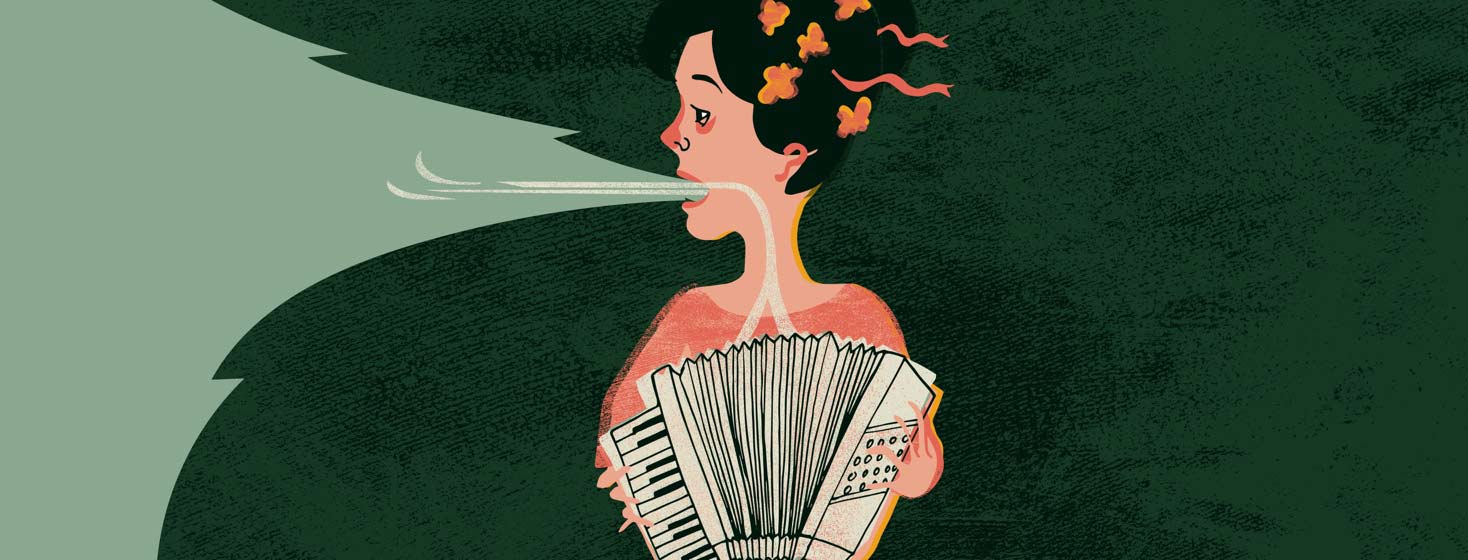What Is Wheezing?
Have you ever felt a vibration in your chest? Maybe you’ve even heard it, like a biological bassoon, making your once silent asthma, audible. Wheezing is a symptom of asthma that many, but not all, experience. I have been a wheezer for as long as I can remember. Only recently, have I began to wonder about what my wheeze actually is. So, like anything I ever wonder about, I researched it; now, I'm writing to share what I've found.
What is a wheeze?
In the 3rd edition of ‘Clinical Methods’, a wheeze is defined as, “...a high-pitched, musical, adventitious lung sound produced by airflow through an abnormally narrowed or compressed airway(s).”1 Although an older publication, this is the definition that is still used today. It’s interesting that even the clinical definition describes a wheeze as “musical," because a wheeze will change pitch, octave, and even decibel depending on the person’s anatomy, exacerbation, or environment--much like an instrument.
A wheeze can come from many different places in the pulmonary system. An obstruction in the airways--from inflammation, mucus, or debris--can be anywhere from the larynx to the bronchi.1 Depending on where the wheeze is and how it sounds, can help a medical team determine the cause--which is not always asthma.
Who wheezes?
The most common misconception of wheezing is that people with asthma wheeze. When, in fact, not all people with asthma wheeze and not all people who wheeze have asthma!2
There are many conditions that can cause a wheeze including, but not limited to: asthma, COPD, bronchitis, GERD, pneumonia, heart failure, vocal cord dysfunction, and many more.2 The danger is, some people believe the falsehood that all asthmatics wheeze and a wheeze is caused by asthma. Even more worrisome, some asthma cases are not taken as seriously, due to the absence of a wheeze.
Why do some people with asthma not wheeze?
As we know, asthma comes in many shapes, sizes, and severities. While many people who have asthma do experience wheezing, some do not. The reason, is quite polarized.
There are two reasons why an asthmatic may not wheeze: one is that their asthma exacerbation is improving, the other is that it is getting worse, much worse.1 Ironic, yes, and also a very serious difference. While some experience their wheeze dissipating due to the airways becoming less obstructed by inflammation, others experience a silence from not enough air moving to make a sound. This is where it becomes crucial that medical teams do more than listen for a wheeze; a mistake could be life-threatening.
My experience wheezing
At this point in my research, I had a much better understanding of the wheeze that I have experienced in my life. I’ve had asthma since infancy, a wheeze has always come with it. I’ve noticed that my wheeze is different depending on my trigger as well.
For example, allergies have been a consistent trigger for my asthma, making me wheeze with a higher pitch wheeze that comes from further up my airways, near my throat. With another trigger, bronchitis, my wheeze is deeper and ‘bubbly’ and located in the lower parts of my chest. Just today, I spent the morning climbing at high elevation, during the hike to the climb I felt a distinct wheeze which was coming from right behind my sternum.
Different triggers, and very different wheezes. I had never noticed a distinction between my wheezes until this research prompted me to be more introspective. At first thought, I was excited to be the first one-person, sans-instrument, orchestra. Not really, that sounds miserable. I did, however, find it amazing that I never noticed the variety of sounds my asthma makes. Now that I am aware of the sounds, my next point of research was about prevention.
Can we prevent wheezing from asthma?
There is some fascinating research being done surrounding wheezing and how to prevent it, mostly in children. A team of researchers in Australia were interested in the effects of fruit and vegetable consumption on chronic wheezing. The results of the meta-analysis were mixed and they suggested further research with no suggestion of treatment other than fruits and vegetables are beneficial for other reasons.3
A separate meta-analysis looked at how daily inhaled corticosteroids (ICS) affected preschoolers with a reoccurring wheeze. The results were that daily ICS had optimal effectiveness at managing the wheezing.4 The issue with consistent medications like ICS at a young age are the lasting side effects of exposure to the substance--an entirely different research question that begs for answers.
The takeaway
Wheezing is something many people experience, not just asthmatics. Also, a person with asthma who doesn’t wheeze is either doing great or needs medical attention.
A single person can experience different wheezes due to different triggers as well, making wheezing a potential musical master-piece; or, more realistically, a way of diagnosing what’s triggering you.
While there is research to combat wheezing as a symptom, there is nothing that “cures” a wheeze. However, some medications can help. Wheezing: a diverse experience, a symptom of symphony, and a diagnostic tool that should be understood, but not isolated.

Join the conversation